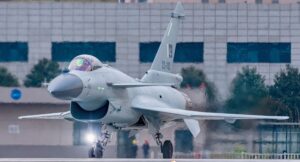Bangladesh and Türkiye are preparing to elevate their growing defence partnership to a strategic level as the two nations hold the fourth round of Foreign Secretary-level talks in Dhaka this week. The discussions are expected to centre on deepening cooperation in defence production, technology transfer, and industrial collaboration under Bangladesh’s Forces Goal 2030 modernisation agenda.
Bangladesh and Türkiye are set to hold the fourth round of Foreign Secretary-level consultations in Dhaka on 7 October, with defence and defence industrial collaboration expected to dominate the agenda. The two-day visit of Turkish Deputy Foreign Minister Berris Ekinci marks a significant step in transforming Dhaka-Ankara relations into a strategic partnership that extends beyond traditional diplomacy and trade.
The meeting, to be held at the State Guest House Padma, will be led by Foreign Secretary Asad Alam Siam on behalf of Bangladesh, while Deputy Foreign Minister Ekinci will head the Turkish delegation. Officials from both sides have confirmed that the dialogue aims to consolidate progress achieved through a series of high-level visits this year and to set a framework for structured cooperation in defence production, technology transfer, and joint research.
Defence Industry in Focus
Bangladesh and Türkiye’s defence cooperation has evolved rapidly over the past decade, with Ankara emerging as one of Dhaka’s most promising partners in defence technology and manufacturing. The forthcoming consultations are expected to translate this growing cooperation into a formalised strategic framework, officials from the Bangladesh Ministry of Foreign Affairs told bdmilitary.com.
“Defence industry development remains one of the priority areas in this round of talks,” a senior official confirmed. “Türkiye has shown serious interest in expanding its defence footprint in Bangladesh through joint ventures, industrial partnerships, and knowledge transfer.”
Türkiye’s recent defence export success, particularly in armoured vehicles, UAVs, and smart munitions, aligns closely with Bangladesh’s ambitions to modernise its armed forces under Forces Goal 2030. Ankara’s ability to combine cost-effective production with NATO-standard technology has made it a natural partner for Dhaka’s maturing defence industry.
High-Level Engagements Lay the Groundwork
This week’s consultations come on the heels of a series of visits that have steadily reinforced defence dialogue between the two nations. In July 2025, Haluk Görgün, President of the Turkish Defence Industry Agency (SSB), visited Dhaka where he met Chief Adviser Professor Muhammad Yunus and Army Chief General Waker-uz-Zaman.
During the visit, Görgün assured Bangladesh of technical and strategic support in developing its own defence industrial base. The Bangladesh Army later confirmed in a social media statement that Ankara expressed willingness to share experience in production line establishment, component manufacturing, and R&D collaboration.
That visit followed earlier exchanges in February, when Foreign Ministry Secretary (East) Nazrul Islam travelled to Ankara for consultations with Ekinci and senior Turkish defence and trade officials. The two sides discussed joint production, investment incentives, and possibilities of establishing a Bangladeshi–Turkish Defence Industry Cooperation Committee.
From Buyer-Seller to Strategic Partner
The shift from a buyer-seller relationship to one of strategic collaboration has been gradual but deliberate. Bangladesh already operates a range of Turkish-origin military hardware, including armoured vehicles, tactical radios, and naval platforms, supplied by leading Turkish defence firms such as Roketsan, Aselsan, and Katmerciler.
Katmerciler’s Khan 4×4 Armoured Personnel Carrier (APC), recently delivered to the Bangladesh Police, is one example of the expanding defence footprint Ankara is carving in Dhaka. Turkish armoured and electronic warfare systems have also found increasing acceptance among Bangladesh’s security forces for their performance and adaptability to tropical conditions.
However, officials now aim to deepen this relationship by localising production. Türkiye’s proposal to establish joint manufacturing facilities in Bangladesh—particularly in armoured vehicle assembly, electronics integration, and UAV maintenance—has been under review by the Bangladesh Ordnance Factories (BOF) and Bangladesh Machine Tools Factory (BMTF).
Sources suggest that discussions during Ekinci’s visit will explore specific project frameworks, including the possibility of co-developing next-generation UAVs, electro-optical systems, and precision-guided munitions.
Building a Sustainable Defence Industry
Bangladesh’s vision for its defence industrialisation draws lessons from Türkiye’s own transformation. Over two decades, Ankara evolved from a heavy importer to a self-reliant defence producer, supplying over 80% of its military needs domestically.
Bangladesh sees parallels with its own ambitions. Under Forces Goal 2030, the country aims to gradually replace imports with locally produced systems and to integrate into global supply chains through technology-sharing partnerships.
A senior official from the Directorate General of Defence Purchase (DGDP) noted that Türkiye’s public-private model of defence industrialisation—where companies like Baykar, STM, and ASELSAN collaborate closely with state institutions—offers a blueprint for Bangladesh’s future.
“Bangladesh’s defence industry is still emerging, but with the right partnerships, especially with Türkiye, it can achieve significant technological autonomy within the next decade,” the official said.
Joint Ventures and Technology Transfer
Several potential joint projects are likely to feature prominently in the discussions this week:
- Armoured Vehicle Production: Expansion of the existing collaboration with Otokar or Katmerciler, with the prospect of local assembly of armoured platforms for both military and paramilitary use.
- Unmanned Systems: Türkiye’s extensive UAV expertise—particularly through Baykar and TAI—may lead to agreements on co-production or technology sharing in surveillance and tactical UAVs.
- Electronics and Optics: Partnerships with Aselsan for communication systems, radar technology, and electro-optical sensors.
- Naval Cooperation: Exploration of future collaboration between the Bangladesh Navy and Turkish shipyards, especially in the design and construction of patrol vessels and logistics ships.
While no formal defence agreement is expected during this visit, diplomats have indicated that Ekinci’s meetings with Bangladesh’s top leadership may pave the way for a Defence Industry Cooperation Framework (DICF) to be formalised later this year.
Energy and Dual-Use Technologies
Interestingly, Türkiye’s growing expertise in energy technology, LNG infrastructure, and renewables also intersects with dual-use capabilities relevant to defence logistics. Turkish firms’ experience in portable energy systems and modular field infrastructure has attracted interest from Bangladesh’s armed forces for potential use in remote and disaster-response operations.
During her meeting with Adviser for Power, Energy and Mineral Resources Muhammad Fouzul Kabir Khan, Ekinci is expected to discuss avenues for Turkish investment in energy projects that have potential defence logistics applications, such as fuel storage, distribution systems, and energy-efficient base designs.
Political Context and Strategic Outlook
Ekinci’s visit is also symbolic of Türkiye’s continued engagement with Bangladesh following the political transition in Dhaka last year. Despite domestic changes, Ankara has maintained an active diplomatic approach, seeking to position Türkiye as a strategic partner in South Asia.
Analysts believe this engagement is driven not only by economic opportunity but also by Türkiye’s broader ambition to expand its geopolitical footprint in the Indo-Pacific through partnerships with emerging economies like Bangladesh.
“Türkiye views Bangladesh as a rising power in the Bay of Bengal region,” said a senior South Asian security analyst. “By aligning on defence and industrial cooperation, Ankara gains a foothold in a strategically significant geography while Bangladesh gains access to cost-effective, high-technology defence systems.”
The Road Ahead
For Bangladesh, the path toward a mature defence partnership with Türkiye represents a critical step in its strategic diversification. As the country seeks to balance relationships with multiple partners—including China, India, and the West—its cooperation with Türkiye offers a unique model that combines technological pragmatism with political non-alignment.
The outcomes of the 7 October talks are expected to be reflected in an updated Bilateral Cooperation Action Plan, which will outline new mechanisms for industrial collaboration, training exchanges, and strategic consultations.
If the anticipated Defence Industry Cooperation Framework materialises later this year, Bangladesh could see its first jointly produced military systems with Türkiye within the next five years—cementing Ankara’s role as one of Dhaka’s key defence technology partners.
Assessment:
The forthcoming Foreign Secretary-level consultations mark a decisive phase in Bangladesh–Türkiye defence relations. With sustained high-level engagement and converging strategic interests, both nations are moving toward a relationship anchored in mutual defence industrial growth, technological self-reliance, and regional stability.
For Bangladesh, cooperation with Türkiye represents not only access to proven, NATO-grade systems but also a pathway to industrial empowerment. For Türkiye, Dhaka offers a strategic partner with regional influence, an expanding defence market, and shared interests in a balanced, multipolar world order.
If effectively implemented, the defence and industrial initiatives discussed this week could transform Bangladesh–Türkiye ties from cordial friendship to a long-term strategic partnership grounded in capability, technology, and trust.

Ayesha Farid is a regional security specialist focusing on South Asia, with over a decade of experience analysing inter-state tensions, cross-border insurgency, and regional power dynamics. She has worked with leading policy think tanks and academic institutions, offering nuanced insights into the complex security challenges shaping the subcontinent. Ayesha’s expertise spans military doctrines, border disputes, and regional cooperation frameworks, making her a vital contributor to BDMilitary’s coverage of South Asian strategic affairs. She leads the Geopolitics & Diplomacy section at BDMilitary. Ayesha holds a dual master’s degree — a Master in International Relations from the IE School of Politics, Economics & Global Affairs, Spain, and a Master of Public Policy from the Munk School of Global Affairs, University of Toronto, Canada — combining deep academic insight with practical policy expertise.



